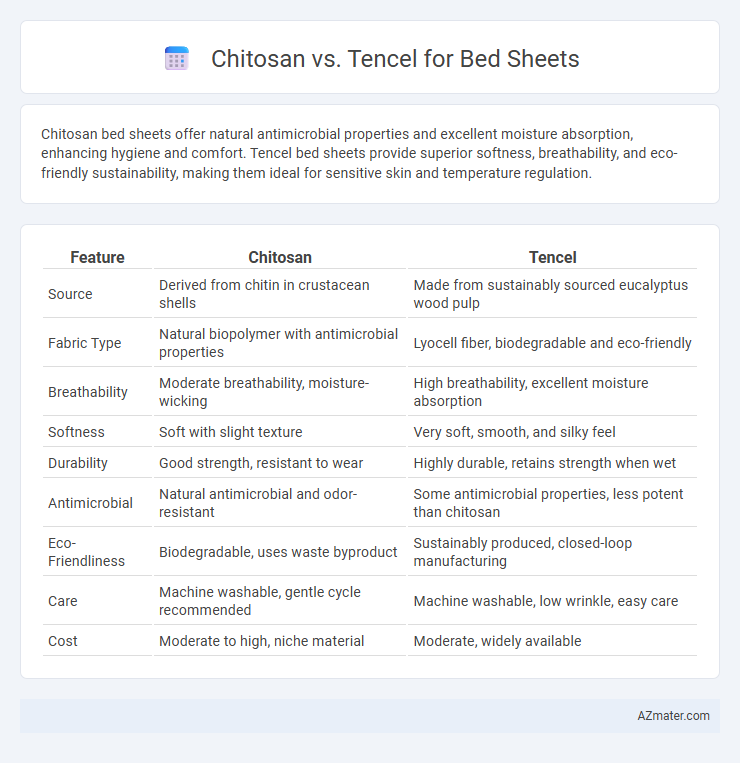Chitosan bed sheets offer natural antimicrobial properties and excellent moisture absorption, enhancing hygiene and comfort. Tencel bed sheets provide superior softness, breathability, and eco-friendly sustainability, making them ideal for sensitive skin and temperature regulation.
Table of Comparison
| Feature | Chitosan | Tencel |
|---|---|---|
| Source | Derived from chitin in crustacean shells | Made from sustainably sourced eucalyptus wood pulp |
| Fabric Type | Natural biopolymer with antimicrobial properties | Lyocell fiber, biodegradable and eco-friendly |
| Breathability | Moderate breathability, moisture-wicking | High breathability, excellent moisture absorption |
| Softness | Soft with slight texture | Very soft, smooth, and silky feel |
| Durability | Good strength, resistant to wear | Highly durable, retains strength when wet |
| Antimicrobial | Natural antimicrobial and odor-resistant | Some antimicrobial properties, less potent than chitosan |
| Eco-Friendliness | Biodegradable, uses waste byproduct | Sustainably produced, closed-loop manufacturing |
| Care | Machine washable, gentle cycle recommended | Machine washable, low wrinkle, easy care |
| Cost | Moderate to high, niche material | Moderate, widely available |
Introduction to Chitosan and Tencel Bed Sheets
Chitosan bed sheets are crafted from natural biopolymers derived from chitin, offering antimicrobial properties and enhanced moisture control, making them ideal for allergy sufferers. Tencel bed sheets, produced from sustainably sourced eucalyptus wood pulp, provide exceptional breathability and softness due to their lyocell fibers. Both materials prioritize eco-friendly production and deliver distinct benefits in comfort and hygiene for high-quality bedding.
Origin and Production Processes
Chitosan bed sheets are derived from chitin found in crustacean shells, undergoing deacetylation to produce chitosan fiber known for its natural antibacterial properties. Tencel bed sheets originate from sustainably sourced eucalyptus wood pulp, processed through a closed-loop system using non-toxic solvents to create eco-friendly lyocell fibers. The contrasting origins--marine biopolymers for chitosan and renewable wood for Tencel--reflect distinct production methods emphasizing biodegradability and environmental impact.
Environmental Impact Comparison
Chitosan bed sheets are derived from natural biopolymers obtained from crustacean shells, offering biodegradability and reducing waste in marine ecosystems. Tencel sheets, made from sustainably harvested eucalyptus wood pulp, utilize a closed-loop process that recycles water and solvents, minimizing environmental pollution. Both materials excel in eco-friendliness, but Tencel's production demonstrates a lower overall carbon footprint and reduced water usage compared to chitosan-based textiles.
Texture and Comfort Differences
Chitosan bed sheets offer a naturally antimicrobial and moisture-wicking texture that feels smooth yet slightly firm, enhancing breathability and skin health. Tencel sheets, crafted from eucalyptus fibers, provide an ultra-soft, silky texture with excellent moisture absorption, creating a cool and luxurious sleeping experience. The comfort difference lies in Chitosan's durable, hypoallergenic properties versus Tencel's lightweight, silky smoothness ideal for sensitive skin.
Breathability and Temperature Regulation
Chitosan bed sheets offer natural antimicrobial properties and moderate breathability, enhancing moisture absorption but may retain heat slightly more than Tencel. Tencel fibers excel in breathability and temperature regulation due to their moisture-wicking capabilities, keeping sleepers cool and dry throughout the night. For optimal comfort in warm climates, Tencel is preferred for its superior airflow and thermal management compared to chitosan-based fabrics.
Durability and Longevity
Chitosan bed sheets exhibit enhanced durability due to their natural antimicrobial properties and resistance to wear, making them ideal for long-term use. Tencel bed sheets, derived from sustainably sourced eucalyptus fibers, offer excellent strength and moisture-wicking capabilities but may show slight wear over extended periods compared to Chitosan blends. Choosing Chitosan ensures prolonged fabric integrity, while Tencel provides a balance of softness and durability suitable for everyday comfort.
Hypoallergenic and Skin-Friendliness
Chitosan bed sheets exhibit strong hypoallergenic properties due to their natural antimicrobial effects, reducing allergens like dust mites and bacteria that can irritate sensitive skin. Tencel sheets are highly skin-friendly, made from sustainably sourced eucalyptus fibers that offer excellent moisture-wicking and breathability, minimizing irritation and promoting a cool, comfortable sleep environment. Both materials provide distinct benefits for allergy sufferers, with chitosan's antimicrobial action complementing Tencel's gentle, smooth texture ideal for sensitive skin.
Moisture Absorption Capabilities
Chitosan bed sheets exhibit excellent moisture absorption due to their natural polysaccharide composition, which enhances breathability and reduces humidity by effectively wicking away sweat. Tencel, made from sustainably sourced eucalyptus fibers, offers superior moisture management through its unique fiber structure that absorbs moisture faster than cotton and releases it quickly, keeping sleepers dry and comfortable. Both materials provide advanced moisture absorption, but Tencel typically outperforms chitosan in rapid drying and cooling properties, ideal for hot and humid climates.
Maintenance and Care Requirements
Chitosan bed sheets require gentle washing with mild detergents to preserve their antimicrobial properties and prevent fiber degradation, typically recommending cold water and air drying to maintain fabric integrity. Tencel bed sheets offer easy maintenance with high durability that resists shrinking and wrinkles, allowing machine washing in warm water and tumble drying on low heat without losing softness or strength. Both materials benefit from avoiding bleach and fabric softeners to extend lifespan, but Tencel provides more convenient care with less risk of damage during regular laundering.
Price and Value for Money
Chitosan bed sheets typically come at a higher price point due to their antimicrobial properties and eco-friendly extraction process but offer significant value for money through enhanced durability and skin benefits. Tencel sheets are generally more affordable and prized for their exceptional softness, moisture-wicking ability, and sustainability, delivering excellent comfort at a mid-range price. Consumers seeking long-term investment prioritize Chitosan for health advantages, while budget-conscious buyers often choose Tencel for premium feel and cost-effectiveness.

Infographic: Chitosan vs Tencel for Bed Sheet
 azmater.com
azmater.com